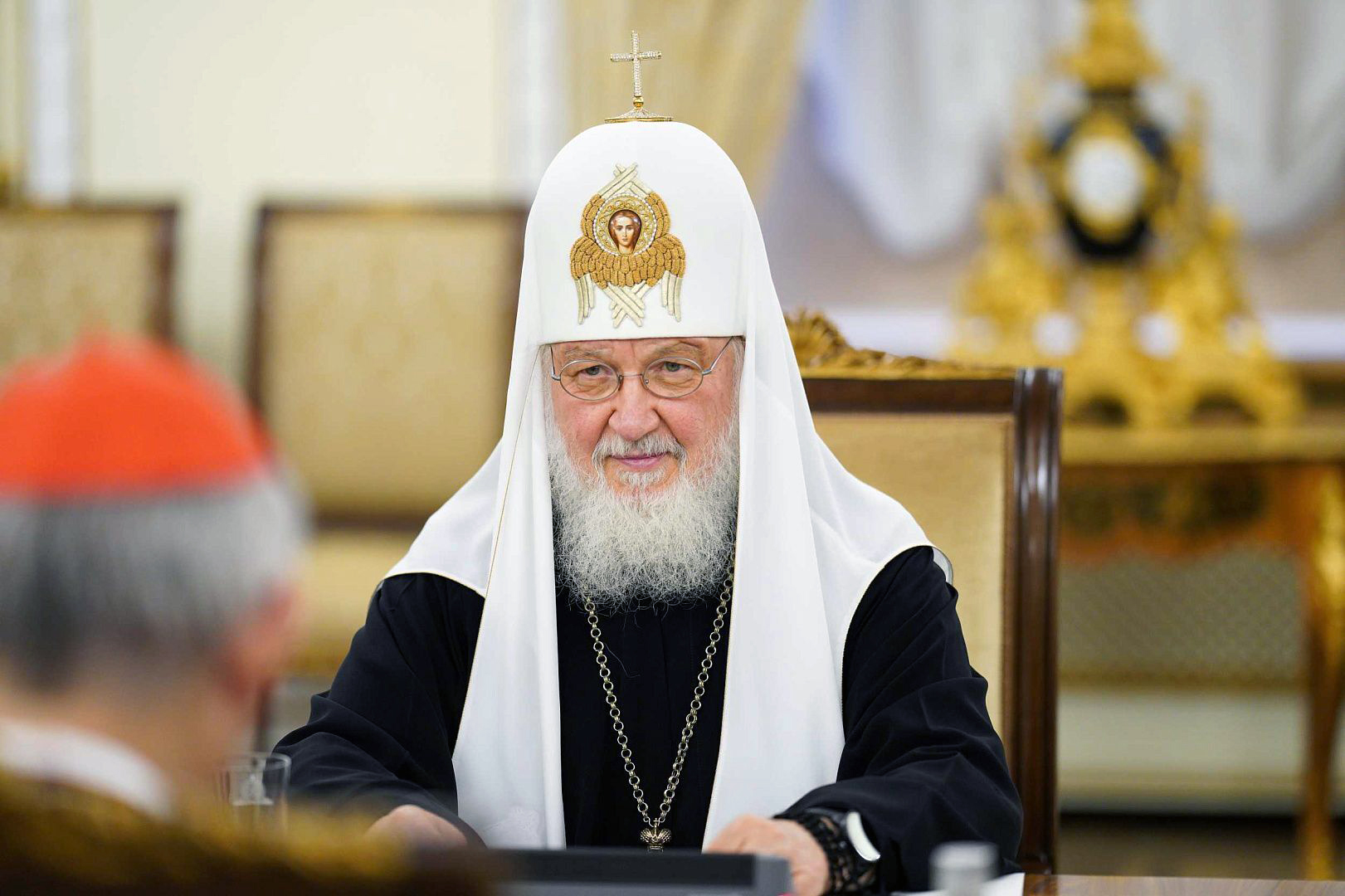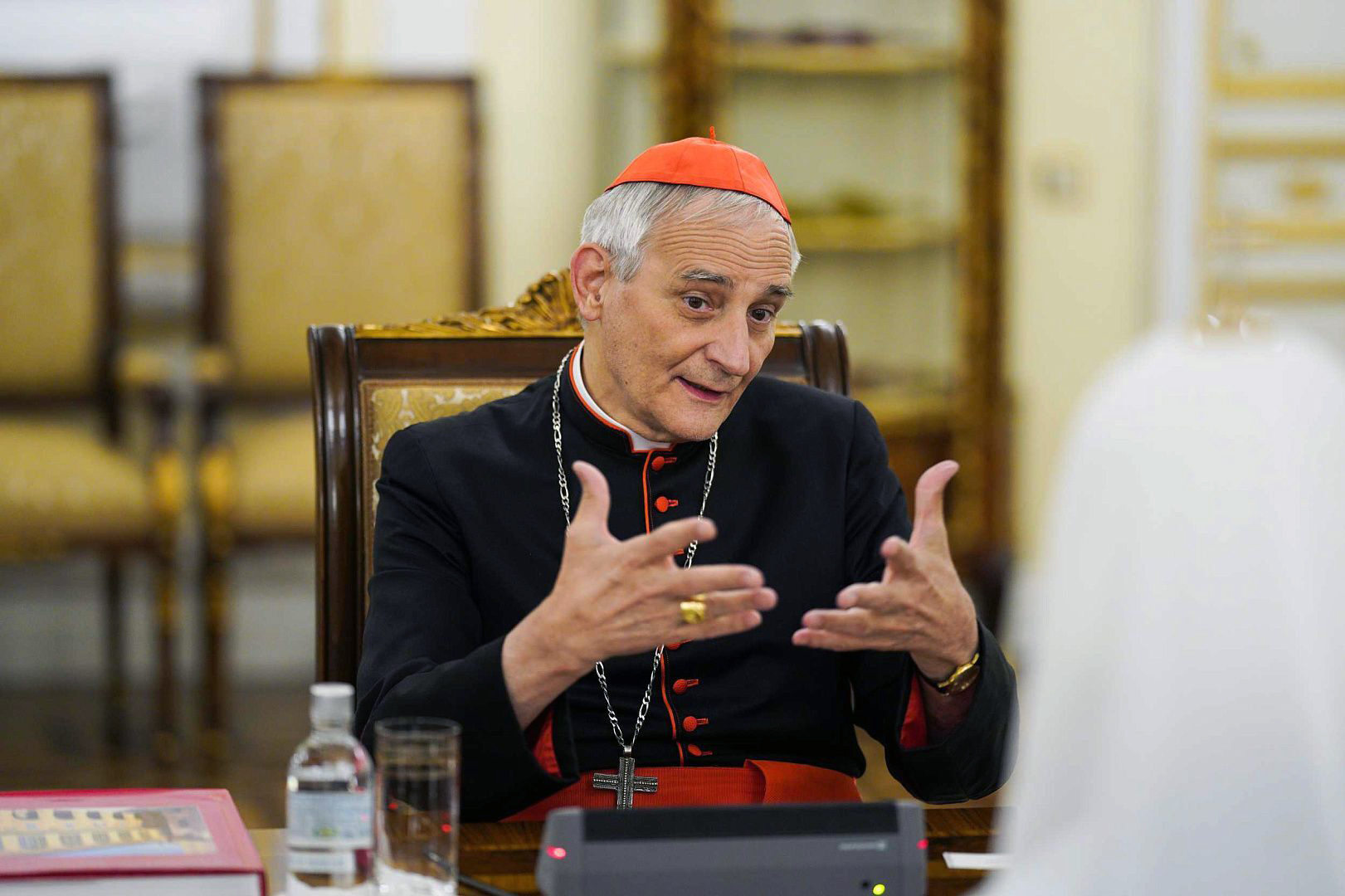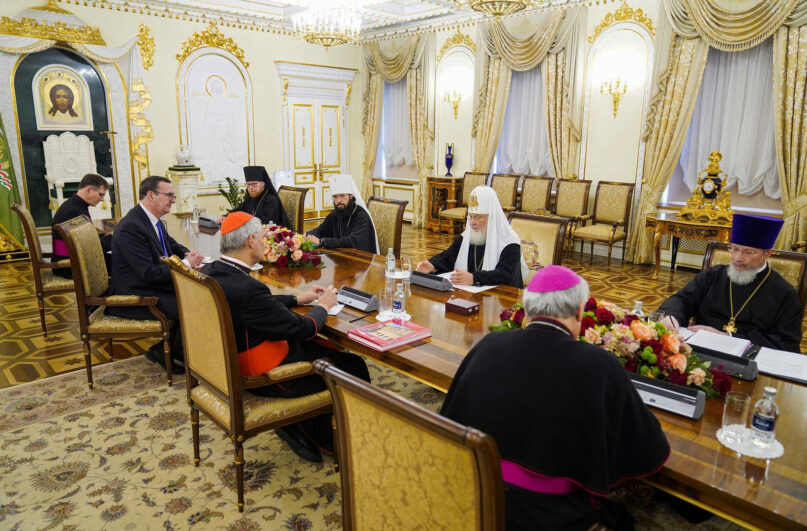VATICAN CITY (RNS) — Pope Francis’ envoy for peace in Ukraine returned to Rome from a three-day visit to Moscow on Thursday (June 29) after agreeing with the Russian Orthodox Patriarch Kirill to collaborate on a peaceful resolution of the war. The two also discussed the possibility of a future meeting with the pope.
Cardinal Matteo Zuppi, the head of the Italian Catholic bishops’ conference who was sent to Ukraine earlier this month by Pope Francis, met with Kirill at the patriarchal seat in Moscow’s Danilov Monastery, accompanied by the papal nuncio to Russia, Archbishop Giovanni d’Aniello, as well as an official of the Community of Sant’Egidio, a lay Catholic group known for its peacemaking efforts that Zuppi has long been close to.
In a statement on Friday (June 30), the Vatican described the meeting with Kirill as “fruitful” and mainly focused on promoting humanitarian initiatives.
“I believe that in the current conditions, marked by great risks and dangers, the church can, through joined efforts, prevent the negative development of the political circumstances,” Kirill said at the meeting, according to a statement.
According to Italian media outlets, Zuppi and Kirill also addressed the opportunity for a meeting between Pope Francis and the patriarch. Francis and Kirill held a historic meeting at an airport in Cuba in 2016 where they signed a Joint Declaration against Christian persecution.
“The meeting between Kirill and Zuppi at this time is a symbol that the two lungs of the church, the Catholic and Orthodox are healthy and may also be a prelude to Pope Francis meeting with Kirill,” said Victor Gaetan, Vatican diplomacy expert and author of the book ‘God’s Diplomats: Pope Francis, Vatican Diplomacy and America’s Armageddon,’ in an interview with Religion News Service on Friday.
Noting that “great problems have arisen in the relationship between Russia and the West,” Kirill said in a statement that at a time when there is “the real threat of a large armed global conflict, it’s very important that all parties involved in maintaining peace and justice come together to prevent such a development.” He called on the church to “serve the cause of justice and peace.”

Patriarch Kirill, right, meets with Cardinal Matteo Zuppi at the Patriarchal Residence in Danilov Monastery, in Moscow, Russia, Thursday, June 29, 2023. Photo by Moscow Patriarchate
During the meeting with Zuppi, Kirill also spoke about the persecutions suffered by the religious and lay Orthodox Christians in Ukraine.
“Whether Pope Francis will go to Moscow himself is a little bit of a stretch at this time,” Gaetan said, but Francis has long voiced his intention to make an official trip to Russia, which would make him the first pontiff to enter the country. Asked recently whether he intended to go to Kyiv as part of his peacemaking efforts, Francis said that Russia’s invasion of Ukraine has made such a visit more important. “I will go to both places or to neither,” the pope said in a March interview with the Argentine paper La Nacion.
“The pope trusts Zuppi and likes him, we know that they are friends, so he can function as Francis’ eyes and ears,” Gaetan said, “and we know Pope Francis would like to go to Moscow himself.”
According to Gaetan, the Vatican mission is also aimed at sending a message to the international community. “I read cardinal Zuppi’s very public trip as a lecture Pope Francis is delivering to NATO countries: No diplomacy is possible without direct personal encounter,” he said.
In the Vatican’s rulebook, peace can only be achieved through international collaboration and diplomacy. Gaetan said that many Vatican diplomats and representatives are currently working in many other countries, like Poland, France and Germany, to promote a ceasefire and put an end to the conflict.
The Vatican’s willingness to keep diplomatic channels with Russia open after the invasion has disillusioned many Ukrainians. While in Kyiv in early June, Zuppi met with political representatives, including President Volodymyr Zelenskyy.
While Zuppi was in Russia this week, Francis held a private audience with family members of Ukrainian diplomats at the Vatican. The pope also sent his almoner, Cardinal Konrad Krajevsy, for an “evangelical expedition” to bring spiritual and practical support to the people in Kherson, a city close to the devastation of the Kakhovka hydroelectric dam. Cardinal Blase Cupich of Chicago was in the Ukrainian city of Lviv this week as well.
In Moscow, Zuppi met with Russian foreign relations adviser Yuri Ushakov and “exchanged opinions and information on humanitarian issues in the context of Ukraine,” according to the Kremlin. While there was no official agreement, Ushakov said that the “dialogue may continue, if needed.”

Cardinal Matteo Zuppi meets with Patriarch Kirill at the patriarchal residence in Danilov Monastery, in Moscow, Russia, Thursday, June 29, 2023. Photo by Moscow Patriarchate
Though it yielded few political results so far, Zuppi’s trip found fertile ground in focusing on the help that the Catholic Church can bring in the humanitarian sector. The cardinal met with the Russian commissioner for the rights of children, Maria Lvova-Belova, to discuss how to help minors displaced by the conflict.
Ukraine claims that over 19,000 children have disappeared since the beginning of the conflict, blaming Russia. The Kremlin has denied responsibility and pushed back against accusations that its soldiers violated children’s human rights.
Zuppi also met with the Russian bishops’ conference, presiding at a concelebration in the Moscow Cathedral of the Archdiocese of the Mother of God. “This was an opportunity,” the Vatican said, “to transmit to the Catholic community the closeness, the thoughts and prayers of the Holy Father.”
In his homily in Russian, Zuppi compared the church to a mother crying for peace. “This is the only reason behind this mission, wanted by the Holy Father who does not surrender and continues to do everything so that the desire for peace rising from the earth might soon be fulfilled,” he said.
The Vatican said that the results of the mission will be brought to the Holy Father’s attention with the intention of laying out future steps and humanitarian initiatives.





